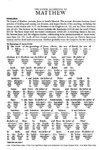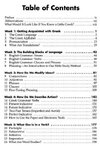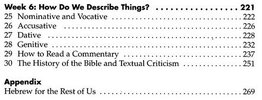Heath
Puritan Board Freshman
I've tried to search for this but haven't found it in old post. I am wondering if anyone can answer specifically if this would be a good help the absolute beginner pick up some things?
I learn best by doing and looking at the kindle version of this I can pick up on words and then as I see them repeated it helps me remember them more. I have a very basic intro to biblical greek and don't have the time to extend that with any formal learning but thought this might be worth skimming from time to time just to keep anything I do know fresh until I do have more time and even allow me to pick up a few new things. I just don't want to get it (hardcopy) and it ultimately not be a good form factor/Layout for this purpose.
Book Info
Thanks!
I learn best by doing and looking at the kindle version of this I can pick up on words and then as I see them repeated it helps me remember them more. I have a very basic intro to biblical greek and don't have the time to extend that with any formal learning but thought this might be worth skimming from time to time just to keep anything I do know fresh until I do have more time and even allow me to pick up a few new things. I just don't want to get it (hardcopy) and it ultimately not be a good form factor/Layout for this purpose.
Book Info
Thanks!



